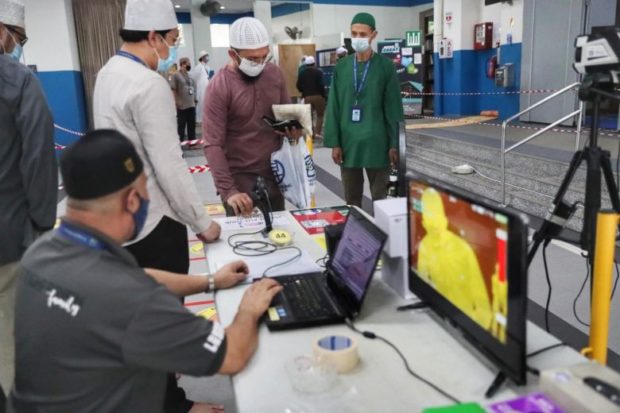New face of worship: Online prayer bookings, talks and classes for mosques in Singapore

Congregants have to adhere to SafeEntry check-ins, temperature screenings and having to wear a mask, among other safe management practices. The Straits Times/Asia News Network
SINGAPORE — Mr Mohamed Fadly was delighted when he secured a slot online for a Friday prayer service at the mosque three weeks ago.
It was the first time the 37-year-old had stepped into a mosque since March, when all 70 mosques here were closed to curb the spread of the coronavirus. Congregational prayers were allowed to resume on June 26.
That day, Mr Fadly, who has been praying at home and watching sermons on YouTube in the last few months, turned up at the Al-Istighfar Mosque in Pasir Ris for its first Friday prayer session at 1pm.
Even though the sermon was shorter than usual, nothing beats hearing it in person, he says.
“I feel thankful and grateful, and hope things will get better and that more congregants can take part in Friday prayers.”
Article continues after this advertisementMr Fadly, who works in the security industry, was among the lucky worshippers who managed to get a slot for a Friday prayer session, each restricted to 50 people.
Article continues after this advertisementDevotees are allowed into the mosque only if they have a booking, which they can make via an online system run by the Islamic Religious Council of Singapore (Muis). To allow more worshippers to perform Friday prayers, each person can book only one slot every three weeks.
There was overwhelming demand for the limited slots – unsurprisingly, since Friday services typically attract capacity crowds.
On June 26, mosques resumed service with two sessions. Because the sessions went smoothly in the last few weeks, 48 mosques added an extra session from Friday (July 17).
Besides SafeEntry check-ins, temperature screenings and having to wear a mask, there are several other safe management practices congregants have to adhere to.
Mr Fadly says he had to use his own prayer mat and stay in a designated space 1m from the other devotees.
The imam who led the prayers, Ustaz Maaz Salim, delivered his sermon with a face shield on, and stood 2m from the first row of congregants.
The mosque had to turn away several people who were not aware of the new guidelines. Some had not secured a booking, while others did not bring their prayer items.
But overall, the sessions went smoothly, notes Mr Azman Mohd Ariffin, Al-Istighfar’s executive chairman.
“We feel blessed we can now conduct Friday prayers. The number of congregants might be small for now, but this is the first small step,” the 57-year-old says, adding that prayer spaces are thoroughly cleaned before and after every session.
Since mosques had to close on March 13 – after two Singaporeans who attended a mass religious gathering in Selangor, Malaysia, tested positive for Covid-19 – Muis has taken a cautious approach.
The increase in sessions was done in accordance with advisories issued by the multi-ministry task force on the coronavirus and the Ministry of Culture, Community and Youth, when more religious activities were allowed to resume in phase two.
Mosques are prepared to act quickly if an infected person is found to have visited their premises. When it was discovered that one such person had been to Al-Ansar Mosque in Bedok North for evening prayers eight times between June 26 and July 2, it was closed for two days for cleaning and disinfection. It has since reopened and resumed prayer services.
Many other mosque activities remain on hold or have been adjusted.
For example, the annual korban ritual during Hari Raya Haji, which falls on July 31, will not take place in Singapore this year. Mosques will instead arrange for the sacrificial slaughter of livestock to be performed in Australia. The meat will then be chilled and shipped here.
The mosques’ social-media channels are also active with livestreams and pre-recorded videos.
In April, Muis launched a Web-based channel called SalamSG TV, which features religious talks and videos in Malay, Tamil, English and Bengali to cater to Muslim foreign workers here.
Educational activities have also moved online. Madrasah classes for young Muslims now take place on video-conferencing platform Zoom.
Mr Azryn Yek’s 10-year-old son and eight-year-old daughter attend online classes conducted by Jamiyah Ar-Rabitah Mosque in Bukit Merah every Saturday.
“My kids miss the personal touch of their teachers at the physical classes,” says the 42-year-old, who works in the building solutions industry.
“And I look forward to the day when we can all go back to the mosques.”
For more news about the novel coronavirus click here.
What you need to know about Coronavirus.
For more information on COVID-19, call the DOH Hotline: (02) 86517800 local 1149/1150.
The Inquirer Foundation supports our healthcare frontliners and is still accepting cash donations to be deposited at Banco de Oro (BDO) current account #007960018860 or donate through PayMaya using this link.